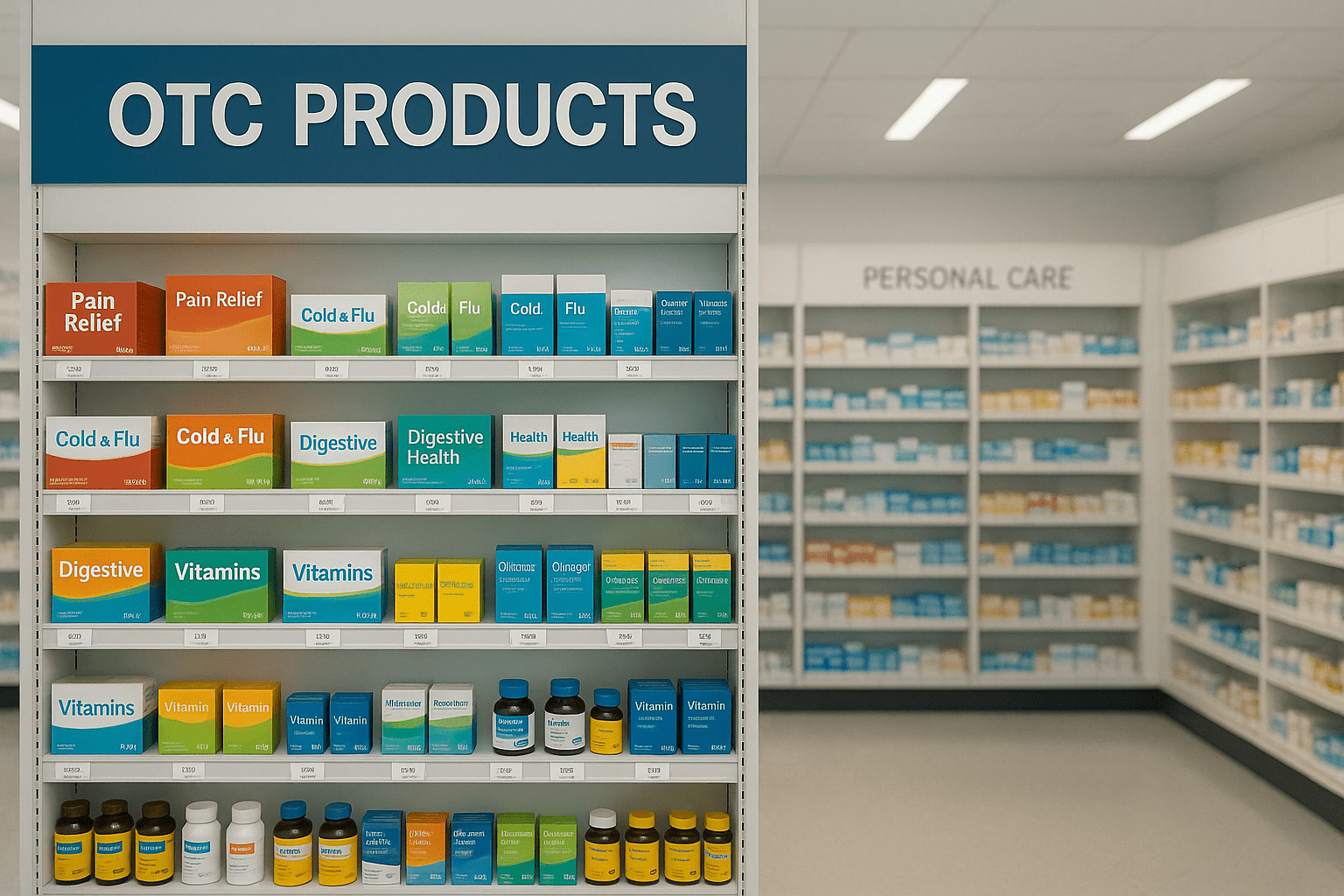In an era where self-care and consumer empowerment are reshaping healthcare, midsize and large pharmaceutical companies increasingly recognize the strategic advantages of expanding their over‑the‑counter (OTC) portfolios. While divestiture can make sense in certain contexts, the benefits of investing in and growing OTC businesses, from stable revenue streams to enhanced brand loyalty, often align more effectively with modern market dynamics and shareholder expectations. However, some companies have chosen to divest their OTC units to sharpen focus on prescription drugs or to reallocate capital.
Self-care expansion or divestment: The Strategic Importance of OTC Segments within Consumer- or Animal Health companies

Key Benefits of Expanding OTC Portfolios
- Stable Revenue & Market Resilience
OTC products (such as pain relievers, cold remedies, digestive aids, and vitamins) tend to maintain consistent demand regardless of economic cycles. During downturns, consumers prioritize essential healthcare items, making OTC lines a valuable counterbalance to the volatility of patented prescription sales. For instance, Sanofi’s 2018 acquisition of Biover, a Belgian herbal supplement maker, fortified its consumer health sector with products that deliver predictable cash flows across Europe and emerging markets. - Brand Strength & Global Reach
A strong OTC brand can become a household name, offering long-term marketing leverage and consumer trust. Bayer’s $14.2 billion purchase of Merck & Co.’s Consumer Health division in 2014 vaulted it into the top tier of OTC leaders. Brands like Alka-Seltzer and Claritin seamlessly integrated into Bayer’s global distribution channels, demonstrating how strategic acquisitions can accelerate market penetration and brand equity. - Cross-Selling Opportunities
Companies with established relationships in retail pharmacies, hospitals, and physician offices can cross-promote OTC products alongside prescription portfolios. Roche, for example, has formed partnerships to distribute cold‑and‑flu remedies through its existing pharmaceutical networks, capitalizing on its trusted reputation among healthcare professionals and retailers. - Innovation & Differentiation
Pharmaceutical R&D capabilities offer a competitive edge in developing novel OTC delivery systems and formulations. Elanco, for instance, introduced Adtab®, the first oral lotilaner tablet for dogs and cats, which combines prescription-level innovation with consumer-friendly dosing and packaging. . Boehringer Ingelheim Animal Health, via its prescription medication arm, invested in chewable (systemic) antiparasitic treatments to protect dogs against flea and tick infestations. In 2023 the Frontpro® range was launched in selected European Countries. This emphasis on convenience and innovation not only supports premium pricing but also reinforces brand differentiation in a competitive OTC landscape. - Risk Diversification
An expanded OTC lineup diversifies revenue sources beyond the typical pitfalls of patent cliffs and regulatory hurdles in prescription markets. STADA Arzneimittel, for example, has strategically grown its consumer healthcare portfolio through acquisitions such as the UK-based Thornton & Ross and Czech company Walmark. These moves reflect a broader trend: using OTC products to spread risk, stabilize earnings, and maintain steady shareholder returns, while leveraging established local brands and distribution networks.
Managing OTC: What Makes It Attractive and What It Demands
While the benefits of OTC expansion are clear, thriving in this space requires distinct capabilities and organizational strengths. Key factors that make OTC businesses attractive also define the skill sets and infrastructure needed to manage them successfully:
Consumer-Focused Marketing
Attractiveness: OTC brands compete directly on shelves and in digital storefronts. Strong consumer marketing builds awareness, trust, and loyalty, converting occasional purchasers into repeat buyers.
Required Capabilities:
-
- Brand Positioning & Storytelling: Crafting clear, compelling narratives around efficacy, safety, and convenience.
- Digital & Social Media Proficiency: Deploying targeted ads, influencer partnerships, and content marketing to reach health-conscious consumers.
- Channel‑Specific Campaigns: Tailoring messages across mass-market retailers, pharmacy chains, e-commerce platforms, and direct-to-consumer channels
Retail and Shopper Marketing Excellence
Attractiveness: With OTC, point-of-purchase influence is paramount. Endcaps, in-store promotions, and pharmacist recommendations drive sales.
Required Capabilities:
-
- Category Management: Optimizing shelf space, pricing strategies, and assortments in collaboration with retailers.
- Planogram & Merchandising Expertise: Designing attractive displays and ensuring in-store compliance.
- Trade Promotions & Rebates: Negotiating volume discounts, bundled offers, and loyalty incentives with retail partners.
Optimized Distribution
Attractiveness: Broad distribution ensures product availability whenever and wherever consumers seek them, pharmacies, supermarkets, online marketplaces, and even non‑traditional outlets like convenience stores.
Required Capabilities:
-
- Supply Chain Agility: Balancing inventory levels to prevent stockouts or overstocks, especially during seasonal peaks (e.g., cold & flu season).
- Omni‑Channel Fulfilment: Integrating brick-and-mortar, e-commerce, and direct-to-consumer logistics for seamless consumer experiences.
- Regulatory Compliance: Navigating varying OTC regulations and labelling requirements across jurisdictions.
Product Innovation
Attractiveness: Continuous innovation keeps brands relevant and can command premium pricing.
Required Capabilities:
-
- Consumer Insights & Foresight: Leveraging market research, focus groups, and big-data analytics to anticipate trends (e.g., natural ingredients, personalized dosages).
- R&D Formulation Expertise: Translating therapeutic know-how into safe, effective, and user‑friendly OTC products.
- Speed-to-Market Execution: Accelerating regulatory approvals, manufacturing scale-up, and launch processes to capitalize on emerging opportunities.
Digital Health Integration and Data Analytics
Attractiveness: Digital touchpoints foster engagement, adherence, and upselling opportunities.
Required Capabilities:
-
- App & Platform Development: Building or partnering on apps for symptom checking, adherence reminders, and telehealth consultations.
- Data Privacy & Security Management: Ensuring compliance with GDPR, HIPAA, and similar regulations when handling consumer health data.
- Advanced Analytics & CRM: Mining purchase and engagement data to personalize marketing, forecast demand, and measure ROI accurately.
Organizational Alignment and Cross‑Functional Coordination
Attractiveness: OTC success hinges on seamless collaboration between R&D, marketing, supply chain, regulatory affairs, and sales.
Required Capabilities:
Talent Acquisition & Development: Recruiting marketers, sales professionals, data scientists, supply chain experts, and regulatory specialists with consumer-health experience.
Agile Governance Models: Empowering cross-functional teams to make rapid decisions.
Integrated KPIs: Aligning commercial and operational metrics (e.g., market share, inventory turnover, digital engagement) to drive unified objectives.
Conclusion
For pharmaceutical companies aiming to navigate today’s consumer driven healthcare landscape, expanding an OTC portfolio offers a compelling path to sustainable growth. The stable, recession‑resistant nature of OTC products, combined with the potential for brand building, cross-channel synergies, and continuous innovation, makes this sector highly attractive. However, success requires specialized capabilities: consumer-centric marketing, retail and distribution excellence, agile supply chains, digital health integration, and cross-functional organizational alignment. By investing in these skills and infrastructures alongside strategic M&A or internal development, pharma firms can build differentiated, resilient OTC businesses that complement their prescription drug operations and deliver long-term shareholder value.
At Ecclis®, we are committed to help Consumer- or Animal Health companies to navigate the OTC journey, leveraging our expertise to optimize your Self-care business opportunities.
